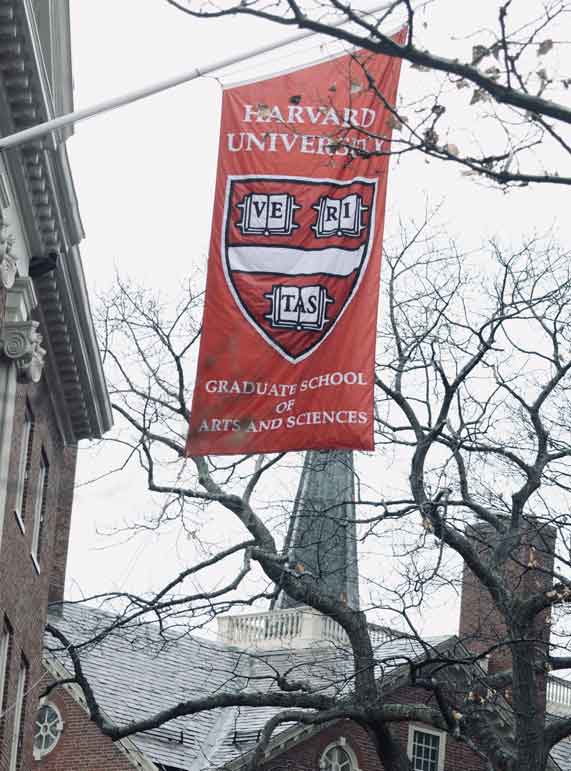
The Education Department is investigating whether Harvard University's use of legacy and donor preferences in admissions violates federal civil rights law following a complaint that the practice is discriminatory.
Lawyers for Civil Rights alleged in their complaint that the school's use of such preferences in undergraduate admissions is unlawful because they overwhelmingly benefit applicants who are White and hurt applicants of color.
Universities that use legacy preferences - which give an advantage to applicants with family who attended the school - have often defended the practice by saying it fosters closer relations with alumni. Graduates are often donors and can benefit schools in a variety of ways. But the preferences have come under intensified attack in recent weeks after the Supreme Court struck down the use of race-based affirmative action in admissions at Harvard and the University of North Carolina at Chapel Hill.
Selective college admissions are typically opaque. But the federal case that ended at the high court brought forth documents that showed how substantial a benefit the legacy tip gave some applicants to Harvard. From 2009 to 2015, according to court records, about 34 percent of U.S. applicants whose parents were Harvard alumni were admitted. The admission rate for applicants who weren't "legacies" was just 6 percent.
Harvard officials say the university has been reviewing its admissions policies in the wake of the Supreme Court ruling to ensure it is complying with the law "and to carry forward Harvard's long-standing commitment to welcoming students of extraordinary talent and promise who come from a wide range of backgrounds, perspectives, and life experiences."
"Our review includes examination of a range of data and information, along with learnings from Harvard's efforts over the past decade to strengthen our ability to attract and support a diverse intellectual community that is fundamental to our pursuit of academic excellence," Nicole Rura, a Harvard spokeswoman, said in a statement.
The university offers significant financial aid to help attract students from varied backgrounds. According to the school, 20 percent of students pay nothing to attend, and more than half receive need-based scholarships. Starting this school year, families with annual incomes of up to $85,000 will not be expected to contribute anything to the cost of their child's education.
The Education Department's Office for Civil Rights confirmed that there is an open investigation of Harvard under Title VI of the Civil Rights Act of 1964. But the office declined to say more, saying it does not comment on open investigations. The law prohibits discrimination on the basis of race, color, or national origin in any program that receives federal funding.
In a letter to Lawyers for Civil Rights, the agency cautioned that "opening the complaint for investigation in no way implies that OCR has made a determination on the merits of the complaint."
Oren Sellstrom, litigation director of Lawyers for Civil Rights, said they are pleased the department acted swiftly to open the investigation. "It's certainly a matter of urgency for our clients and the communities we work with," he said. The complaint was filed on behalf of the African Community Economic Development of New England, the Greater Boston Latino Network and the Chica Project.
He noted that immediately after the Supreme Court decision on affirmative action, President Biden urged federal agencies to investigate unfair barriers to equal opportunity for students of color. Biden said legacy preferences "expand privilege instead of opportunity."
Former Harvard president Lawrence H. Summers, in an op-ed for The Washington Post, said ending such preferences is one of many changes elite colleges should make.
Last fall, a Washington Post-Schar School poll found that 75 percent of Americans believe it is inappropriate for universities to give preferential treatment in admissions to applicants whose family graduated from the school.
Sellstrom said court records from the affirmative action case indicated that nearly 70 percent of legacy applicants and donor-related applicants are White. Court documents also suggested that if legacy preferences had been removed from the process, admissions for Black, Latino and Asian students would all have increased, he said.
Sellstrom said Harvard should follow the lead of schools, such as MIT, Amherst College and Johns Hopkins University that have voluntarily abandoned legacy preferences. In recent days, Wesleyan University and the University of Minnesota announced that they would no longer use them.
"But if Harvard does not," Sellstrom said, "we will move forward expeditiously in prosecuting our complaint."


 Contact The Editor
Contact The Editor
 Articles By This Author
Articles By This Author